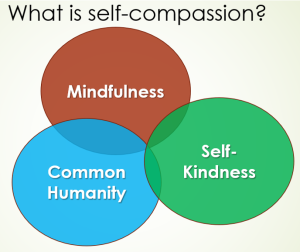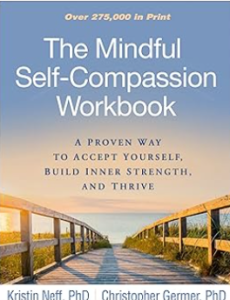
by Richard Weil, M.Ed., CDE
Founder and Director
Transformation Weight Control
www.transformationweightcontrol.com
No one ever lost weight and successfully prevented regain by beating themselves up.
“You can search throughout the entire universe for someone who is more deserving of your love and affection than you are yourself, and that person is not to be found anywhere. You yourself, as much as anybody in the entire universe, deserve your love and affection.” Buddha
“Do unto you as you would do unto others.” Neff and Germer 2018

Mindfulness. Put simply, this is about staying in the moment without too much judgment. With respect to self-compassion, this means at times we have to be mindful of our pain and our struggle. Yet typically, people try to avoid these emotions. One goal of self-compassion is to learn how to just be with those feelings. That also means not trying to fix everything right away.
Self-kindness. This involves responding to our suffering with kind-heartedness and care in a non-judgmental way. It helps to imagine a good friend approaching to talk about a troublesome crisis. How would we react? What would we say or do? What would we want to avoid doing so as not to seem indifferent or disrespectful? Would you talk to a friend the way you talk to yourself?
Common humanity. This is about recognizing that all people live imperfect lives, especially under the current circumstances. That may seem obvious, but emotionally, when we suffer, we tend to believe this should not be happening to us. This, in turn, can lead people to feeling disconnected. So, not only do we have to face the struggle itself, but we also have to deal with feelings of shame about failing. But when we manage to remember this is part of the human experience, we feel better connected to other people, and it gives us a sense of perspective.
Why be self-compassionate?
Self-compassion is positively correlated with positive affect and negatively correlated with negative affect. Leary et al Journal of Personality and Social Psychology, 2007
Self-compassion predicts more stable feelings of self-worth than self-esteem and was less contingent on particular outcomes. Self-compassion also has a stronger negative association with social comparison, public self-consciousness, self-rumination, anger, and need for cognitive closure. Neff and Vonk Journal of Personality Feb 2009
Students who are higher in self-compassion are less likely to suppress their emotions following a failure and more likely to use emotion approach coping strategies such as acceptance and reinterpretation. Neff et al Self and Identity 2005
Self-compassion is significantly correlated with positive mental health outcomes such as less depression and anxiety and greater life satisfaction. It is also positively correlated with emotional intelligence, that is, attending to and understanding one’s own feelings and ability to regulate mood. Neff Self and Identity 2003
Self-compassion has a significant positive association with self-reported measures of happiness, optimism, positive affect, wisdom, personal initiative, curiosity and exploration, agreeableness, extroversion, and conscientiousness. It has a significant negative association with negative affect and neuroticism. It predicts significant variance in positive psychological health beyond that attributable to personality. Unlike self-esteem, self-compassion helps buffer against anxiety. Increases in self-compassion occurring over a one-month interval are associated with increased psychological well-being. Neff et al Journal Of Research In Personality 2007
For further reading. The Mindful Self-Compassion Workbook by Kristen Neff and Christopher Germer
© 2024 Richard Weil All Rights Reserved